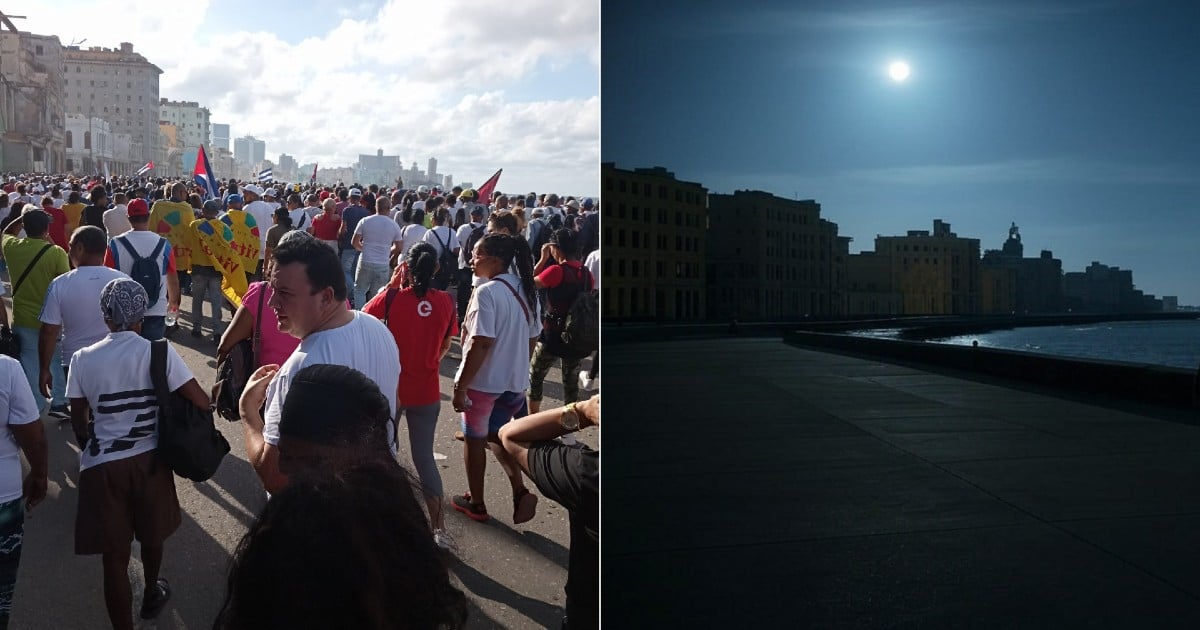Today, Miguel Díaz-Canel once again orchestrated a "March of the Combative People" along the Havana Malecón. As is customary, participants were gathered from among ministry workers, hospital staff, students, and members of military units and the MININT, herded towards the parade by party leaders, union officials, or CDR presidents. The same choreography played out: flags held high, tired slogans like "Homeland or Death, We Will Overcome!" and "Down with the Blockade!" echoed amidst a peculiar blend of false euphoria and resignation that has become a hallmark of these events. Díaz-Canel attempts to project control, yet what he reveals is his fear. If the people truly supported him, there would be no need to force anyone to march or mobilize military trucks.
However, what stands out is the demeanor of many participants. Some laugh, others take photos, and many seem to enjoy the occasion as if it were a public festivity. Perhaps, for some, it is a chance to escape work for a day, break from the monotonous routine, or meet friends amidst the parade. But what do these Cubans actually hope to achieve by participating? Do they believe that these worn-out phrases and the same slogans repeated for 65 years will alter reality? Do they momentarily forget the daily misery, the blackouts, the endless lines, and the shortage of everything?
The answer is not straightforward, but one thing is clear: the power of habit and routine. For many, the parade is just another obligation, akin to going to work or attending a union meeting. It's something to be endured. There's no reflection, merely mental exhaustion. But there's something even sadder: many have normalized humiliation. Anger has dissipated. They do not protest because they know there's no space to do so without repercussions, and they have learned to coexist with double standards: today, they shout "Keep your hands off Cuba!" while knowing that tomorrow they won't have money to buy a pound of rice or a carton of eggs.
Perhaps, for a few hours, some prefer to disconnect from reality and "play" at revolution, to laugh, socialize, and feel part of a "crowd," even though deep down, they know that crowd is made up of equally tired, equally frustrated, equally trapped individuals. It's the syndrome of "pretending": pretending to believe, to support, to participate. But do they truly believe? Do they genuinely support?
When the parade concludes, the illusion vanishes. Participants return home and confront the real Cuba: streets darkened by blackouts, fans that don't spin, empty refrigerators, scarcity of everything, and the anxiety of not knowing what will be eaten the next day. The great irony is that those who marched today will be in the market line tomorrow, cursing the very government they "supported" with hollow chants.
The contrast between the parade and reality is as grotesque as the official propaganda we'll see on the news tonight. Díaz-Canel will be shown smiling, flag in hand, proclaiming yet another "victory of the revolution." What won't be said is that once the parade ended, the blackout remained. It won't be mentioned, but every Cuban knows it.
Understanding the Reality of Cuban Marches
Why are Cubans compelled to participate in these marches?
Cubans are often coerced into participating in these marches by political leaders, union officials, or community leaders, reflecting the regime's need to display a facade of widespread support.
How do the marches relate to the daily lives of Cubans?
These marches are a stark contrast to the daily hardships faced by Cubans, such as blackouts and shortages, highlighting the disparity between government propaganda and reality.
What emotions are associated with participating in these marches?
Participants often experience a mix of false enthusiasm and resignation, with some treating it as a temporary escape from the hardships of everyday life.
